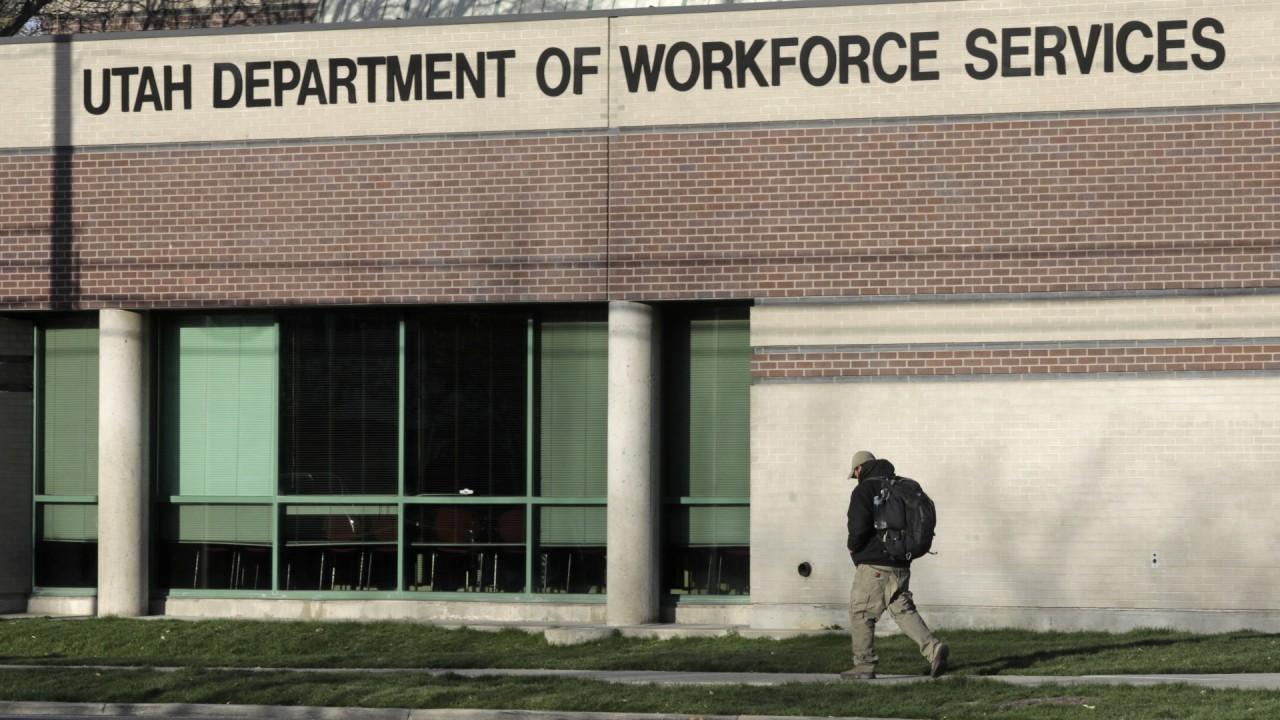Public transit workers hit hard by coronavirus pandemic
More public transit workers in New York City have died from COVID-19 than the NYPD and FDNY combined; Bryan Llenas reports from New York City.
Get all the latest news on coronavirus and more delivered daily to your inbox. Sign up here.
At least 75 public transit workers in a dozen states have died of the coronavirus nationwide, according to America’s largest transit unions, which are urging the federal government to do more to protect bus and train operators who have suffered in part, they say, because of late recommendations by the Centers for Disease Control and Prevention.
Bus and train operators in New York City - the epicenter of the COVID-19 pandemic in the United States - have been the hardest hit. The Metropolitan Transportation Authority (MTA), the largest in the country, has suffered at least 59 deaths - twice as many COVID-19 fatalities as the NYPD and FDNY combined.
“We have been devastated by this virus,” Interim MTA President Sarah Feinberg told Fox News. “They are heroes, moving heroes. We're moving the essential workers who are fighting this crisis.”
CLICK HERE FULL CORONAVIRUS COVERAGE
New York City’s bus and subway operators have been working 24 hours a day to transport doctors, nurses, and emergency responders to and from work during the pandemic, with little fanfare.
However, just last week, employees reportedly began speaking out for the first time, criticizing the MTA of not acting sooner and doing more to protect them from the virus.
The MTA insists it's taken industry-leading steps to protect the workforce and calls claims that its pandemic response was sluggish “baseless.” It is now instead blaming the CDC for issuing late face mask recommendations which caused confusion and delays endangering its workforce.
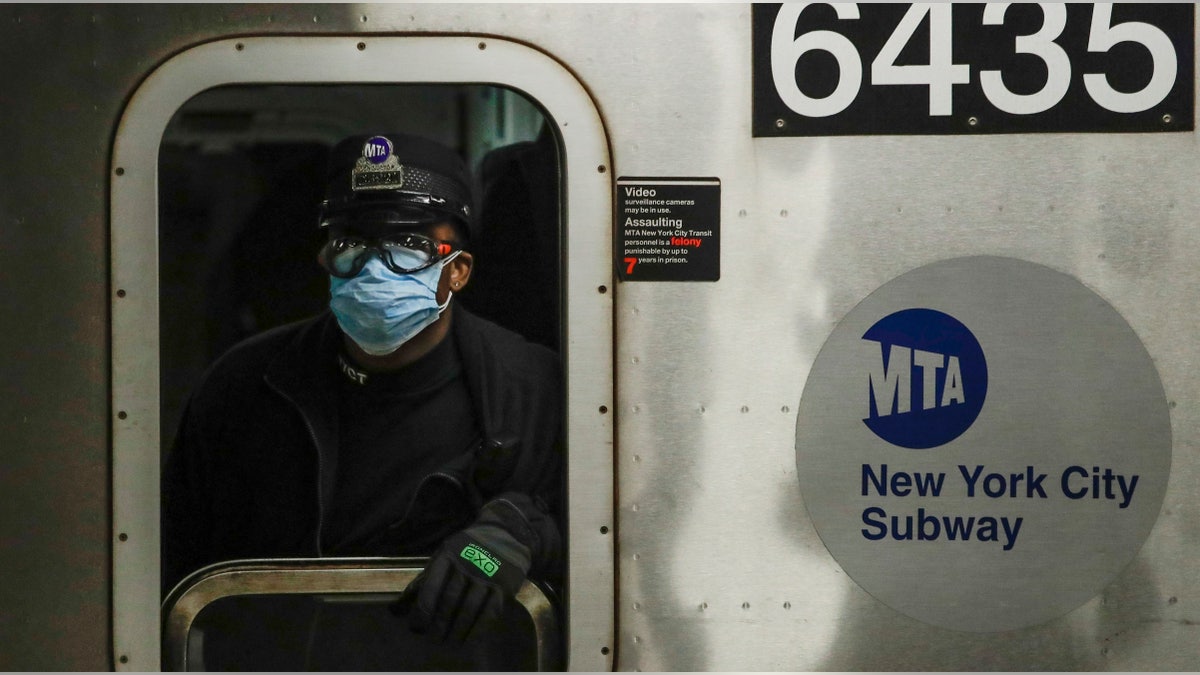
An MTA worker wears personal protective equipment at the Grand Army Plaza station Tuesday, April 7, 2020, in the Brooklyn borough of New York. The new coronavirus causes mild or moderate symptoms for most people, but for some, especially older adults and people with existing health problems, it can cause more severe illness or death. (AP Photo/Frank Franklin II)
“We had a pandemic plan in place,” Feinberg said. “We are a responsible agency that took planning for something like this really seriously and we had supplies and we didn't distribute them early on because the medical experts told us not to.”
For months, the CDC advised Americans not to wear masks and only to wear a mask if ill. On April 3rd, the CDC changed its guidance, recommending Americans wear a face covering in public, citing new studies showing COVID-19 can be transmitted by asymptomatic people.
The MTA says they began distributing masks a week before the CDC’s decision.
“We finally threw our hands in the air,” Feinberg said. “Several days before the CDC changed their guidance, we went ahead and started distributing masks and gloves to our workers. And I think that was the right thing to do. In hindsight, I wish we'd done it even faster.”
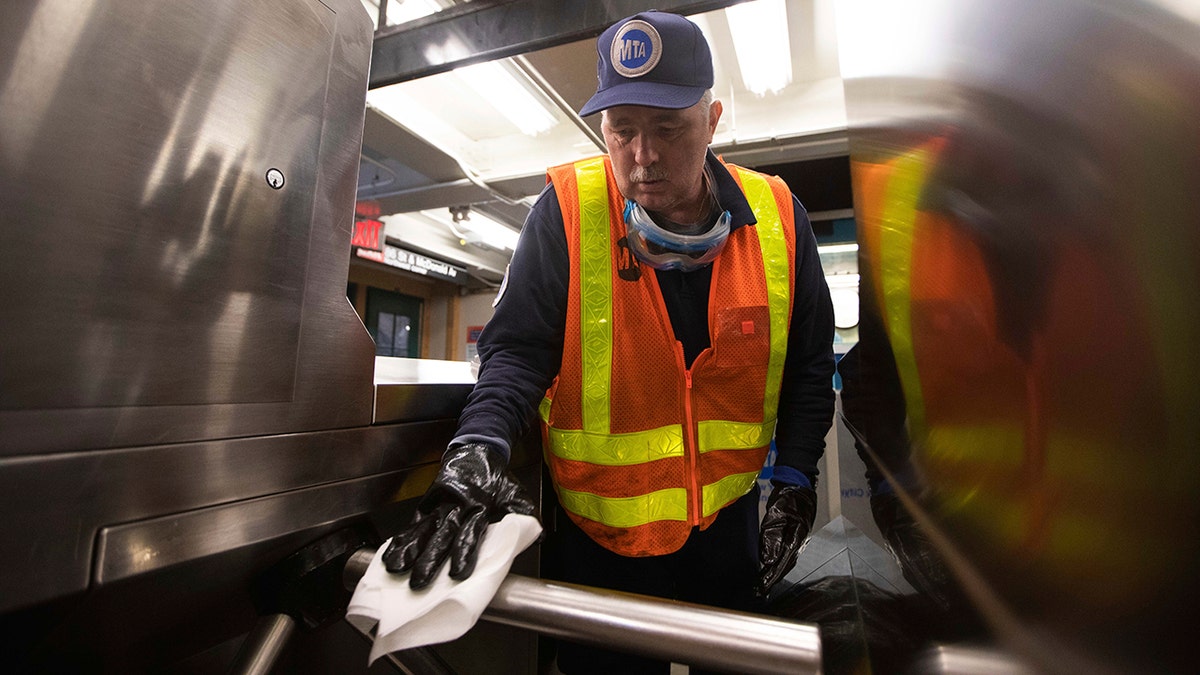
Metropolitan Transportation Authority worker Duane Clark works to sanitize surfaces at the Avenue X subway station, Tuesday, March 3, 2020, in the Brooklyn borough of New York. The MTA is stepping up efforts to sanitize cars and stations as fears mount over the coronavirus. (AP Photo/Kevin Hagen)
The two unions representing the overwhelming majority of U.S. transit workers also wish the MTA had acted quicker.
“The truth of the matter is, if the MTA would have acted sooner, there would have been less fatalities,” said John Samuelsen, international president of the Transport Workers Union of America. “I think it’s an absolute certainty that less transit workers would’ve died if the response in terms of proper protective equipment would have occurred earlier.”
The TWU and the Amalgamated Transit Union are working in tandem with public transit agencies to enact protective COVID-19 policies and the unions are pressuring the federal government to enact a uniform set of guidelines for public transit systems nationwide.
TEXAS SPECIAL ED TEACHER USES STIMULUS CHECK TO MAKE MASKS FOR STUDENTS
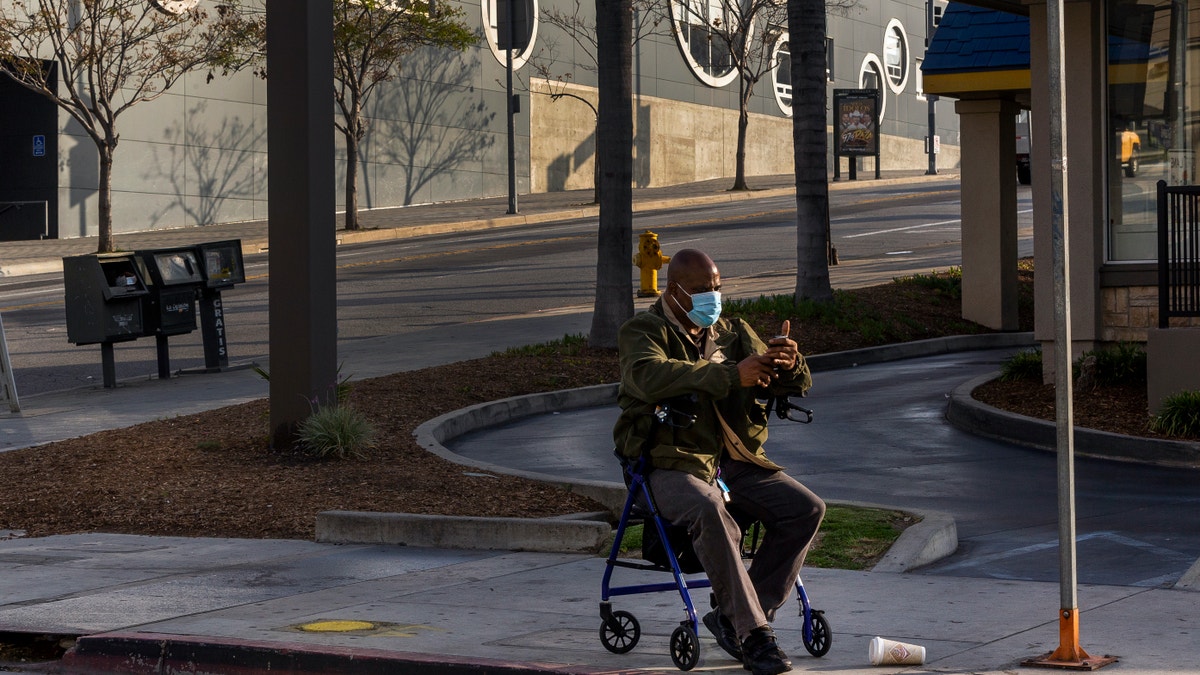
A person wearing a mask waits for a bus in downtown Los Angeles on Thursday, April 2, 2020. Metro bus ridership has plummeted during the coronavirus outbreak. (AP Photo/Damian Dovarganes)
There are more than 435,000 public transit workers in America and they all work for different transit agencies either run by the municipality or run by a contracted private vendor. Unlike the airline industry, there is no Federal Aviation Administration that can swiftly enact public transit guidelines.
“There has to be a federal standard that applies to all transit agencies across the country,” Samuelsen told Fox News. “Because otherwise there will be a lack of uniformity that will cost lives and spread the disease further.”
The unions are worried there is not enough personal protective equipment being distributed nationwide to adequately protect transit workers whose jobs involve moving large groups of people every day.
“Transit systems have been caught absolutely flat-footed. Pants around their ankles,” Samuelsen said, “in terms of providing a proper and safe workplace for transit workers.”
PUBLIC TRANSIT SYSTEMS TAKE ACTION
America’s public transit systems with the largest ridership have generally cut the number of trains and buses in service, increased sanitation practices on all vehicles, are encouraging riders to wear face covers, and are requiring passengers to enter buses through the rear doors in an effort to protect bus operators.
No state, however, has gone as far as enacting requirements as New Jersey.
Gov. Phil Murphy signed an executive order requiring all personnel and customers on New Jersey Transit vehicles and other private carriers to wear face coverings, and it is limiting the capacity allowed on its buses and trains to 50 percent to ensure social distancing.
CUOMO, NORTHEASTERN GOVERNORS ANNOUNCE 'COORDINATED' REGIONAL EFFORT TO REOPEN AMID CORONAVIRUS
In New York City, workers and customers are recommended to wear face coverings but they are not required. The city has also not issued a capacity requirement on buses and trains.
The MTA has distributed nearly 750,000 surgical masks including 300,000 N95 masks, 50,000 small hand sanitizer bottles and millions of gloves. Employees are disinfecting more than 8,000 train cars and 5,000 buses nightly, requiring rear door boarding on buses by passengers, and eliminated hand to hand cash transactions on buses and at train stops.
The MTA has also deployed a “temperature brigade” checking about 2,000 employees a day and Feinberg said she wants to expand this, adding, “I would like to see every single worker have their temperature taken before they show up for their shift.”
Some transit agencies in Chicago, Philadelphia, and San Francisco, for instance, have instituted capacity guidelines -- giving bus operators the authority to skip stops if their buses are too full. The Chicago Transit Authority defines a crowded standard bus as 15 or more passengers and the SEPTA in Philadelphia has limited the number to 20.
The Metro in Washington, D.C. has closed the first and last cars of all its trains and shut down about half of the Metro rail stations.
Houston has installed dividers to keep passengers out of the front rows of buses. Los Angeles has installed hand sanitizers on buses and trains.
Transit unions are concerned transit systems are not providing enough PPE for workers. SEPTA recently secured 10,000 masks for its workers. This week King County Metro in Washington state began giving out two fabric face coverings for their workers, and in Massachusetts, the MBTA began distributing masks last week.
HEROES COMPENSATION FUND
Feinberg believes the federal government should start a hero’s compensation fund providing hazard pay for public transit workers and compensation for the families of public transit workers who have died from COVID-19.
Among the MTA’s 59 dead include Oliver Cyrus, a 20-year veteran MTA bus operator, and Warren Tucker, a five-year veteran bus maintenance worker.
Described by his supervisor as a humble man, Cyrus “did everything for his daughter Tamia.” A creature of habit, Cyrus was the kind of colleague who would stop by every office, knocking on doors to say good morning and hello.
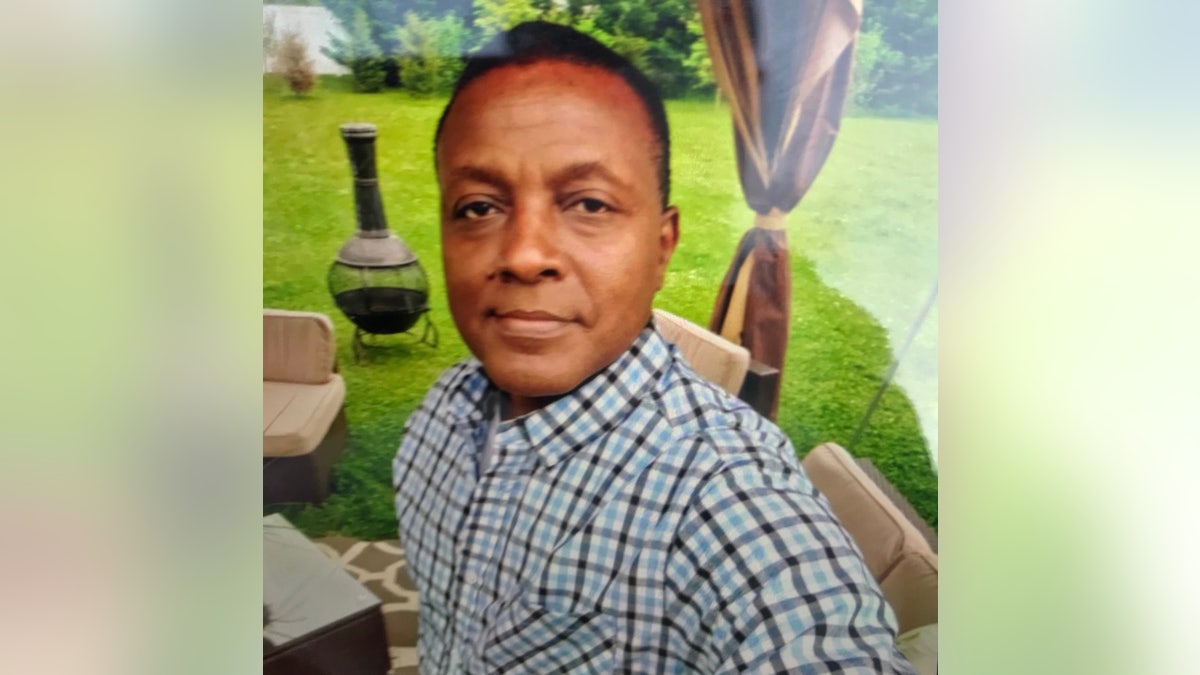
Oliver Cyrus, a 20-year veteran MTA bus operator, died from coronavirus. (MTA)
Tucker was nicknamed “Big Tuck” and “Big Dawg Tucks” for his larger than life personality.
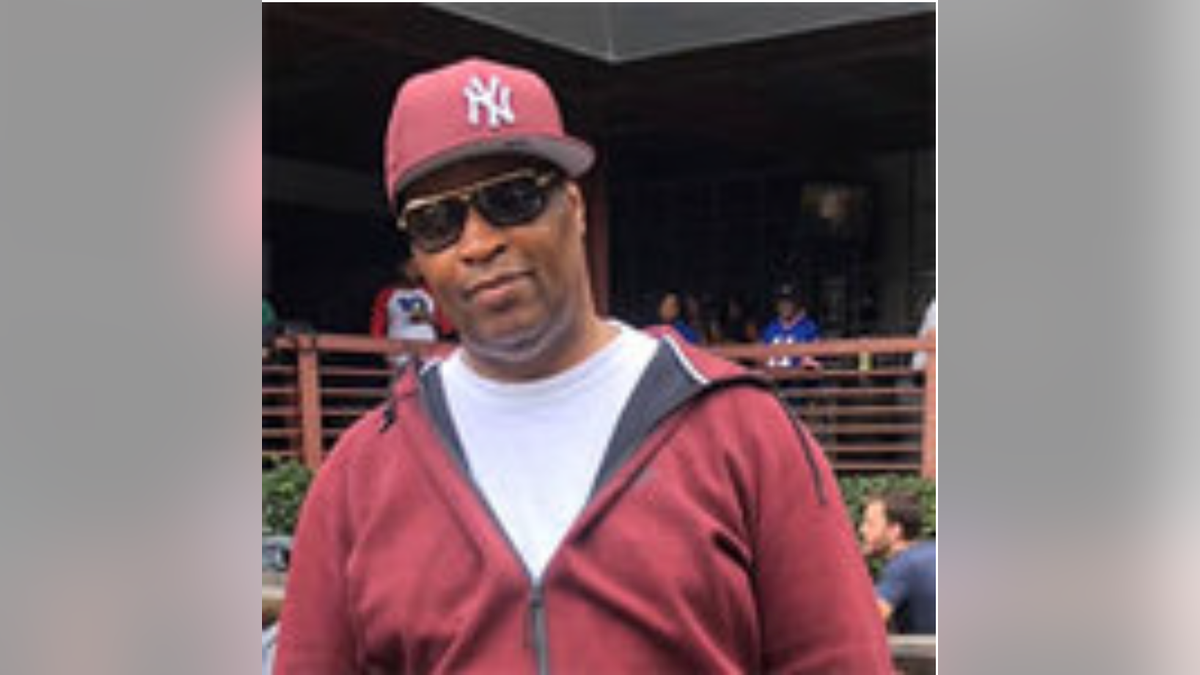
Warren Tucker, a five-year veteran bus maintenance worker, died of coronavirus. (MTA)
Frequently wearing a flat brim Yankees hat, Tucker was hard to miss sitting atop the forklift at the Central Maintenance Facility. His supervisor said he was “a great guy and will be missed by everyone that knew him.”
CLICK HERE TO GET THE FOX NEWS APP
Unions theorize public transit workers in New York City are dying in higher numbers than other first responders because of the nature of the job. Transit workers are often older, work sedentary jobs, and breathe in chemicals all day from diesel to garbage in the subway.
“Transit workers are first responders,” Feinberg said when asked about whether hundreds of transit workers nationwide could die from COVID-19. “We continue to show up every day and do our job to move people during this crisis, and we are paying a heavy price.”









































